Podcast
Questions and Answers
What does human geography investigate?
What does human geography investigate?
- Astrophysical phenomena
- Political theories
- Relationships between humans and the environment (correct)
- Quantum mechanics
Who introduced the concept of cultural landscape?
Who introduced the concept of cultural landscape?
- Charles Dickens
- Carl Sagan
- Charles Darwin
- Carl Sauer (correct)
What does the concept of cultural landscape emphasize?
What does the concept of cultural landscape emphasize?
- The role of astrophysical phenomena in culture
- The study of quantum mechanics
- The impact of politics on society
- The unique spatial representations created by human activities (correct)
What is an example of how culture shapes landscapes?
What is an example of how culture shapes landscapes?
Which topic is studied under human-environment interaction in human geography?
Which topic is studied under human-environment interaction in human geography?
Who is known for studying the influence of environmental factors on agricultural systems?
Who is known for studying the influence of environmental factors on agricultural systems?
How does deforestation in the Amazon rainforest impact the environment and economy?
How does deforestation in the Amazon rainforest impact the environment and economy?
What do human geographers study in relation to population dynamics?
What do human geographers study in relation to population dynamics?
How do transportation systems influence human behavior according to human geographers?
How do transportation systems influence human behavior according to human geographers?
Why do human geographers study spatial patterns at various scales?
Why do human geographers study spatial patterns at various scales?
Which technology has revolutionized human geography by enabling researchers to visualize spatial data?
Which technology has revolutionized human geography by enabling researchers to visualize spatial data?
In what ways do geographers contribute to society?
In what ways do geographers contribute to society?
Study Notes
Exploring Human Geography
Human geography is an interdisciplinary field that investigates the relationships between people and their environment, focusing on the spatial dimensions of human behavior, culture, and social interactions. This vast and diverse area of study encompasses a wide range of subtopics that help us understand the complexities of our world.
Culture and Identity
Human geography delves into the ways in which culture shapes landscapes and how landscapes, in turn, shape culture. The concept of cultural landscape, first introduced by Carl Sauer, highlights how human activities, such as agriculture, architecture, and land use, create unique spatial representations of culture. For instance, the Spanish colonial missions in California and the ancient Mayan cities in Central America are both examples of how cultures have left their physical imprint on the landscape.
Human-Environment Interaction
Human geographers study how humans interact with their environment, focusing on the ways in which people shape and are shaped by their physical surroundings. This includes examining topics such as sustainable development, climate change, and environmental justice. For example, researchers like Gordon MacDonald have investigated how environmental factors like climate, soil, and topography influence agricultural systems and land use patterns across the globe.
Land Use and Land Cover
Human geographers examine how people use the land and how land use influences the environment. Land use patterns, such as urban, agricultural, and forested areas, can significantly impact ecosystems and local economies. For example, deforestation in the Amazon rainforest has both environmental and economic implications, with consequences for species conservation and local livelihoods.
Population Dynamics
Human geographers study demographic trends, migration patterns, and settlement dynamics to better understand the distribution of human populations across the globe. This includes examining topics such as urbanization, rural-to-urban migration, and population growth. For instance, researchers like Jean-Paul Chavanaz have explored the relationship between urbanization and economic development, revealing the complex interplay between population growth, city planning, and socioeconomic outcomes.
Mobility and Transportation
Human geographers study how transportation systems and mobility patterns influence human behavior and societal change. This includes examining topics such as urban transportation planning, global supply chains, and migration. For example, researchers like Elijah Meeks have investigated how transportation infrastructure, such as airports and train stations, can shape urban development and social dynamics.
Regionalization and Scales of Analysis
Human geographers study spatial patterns and processes at various scales, from local to global, to better understand the complex interrelationships among human communities, environments, and socioeconomic systems. This includes examining topics such as regional development, globalization, and scale transitions. For example, researchers like Geoffrey J.D. Hewitt have explored the concept of scale and its implications for understanding sustainable urban development.
Methods and Techniques
Human geographers employ a wide range of methods and techniques to conduct their research, including spatial analysis, remote sensing, and qualitative methods such as interviews and ethnography. Geographic Information Systems (GIS) and Global Positioning System (GPS) technologies have revolutionized human geography by enabling researchers to visualize, analyze, and interpret spatial data.
Contributions to Society
Human geography has significant implications for society, as its findings can inform policy-making, urban planning, and resource management. For instance, geographers have contributed to efforts to combat climate change, prevent natural disasters, and promote sustainable development in both urban and rural contexts. By understanding the complex interrelationships between human populations and their environments, geographers can help to develop more sustainable and equitable solutions to global challenges.
In summary, human geography is a vibrant and multifaceted field that encompasses a wide range of subtopics and methods. By studying the relationships between people and their environments, human geographers can gain valuable insights into the complexities of our world, contributing to more sustainable and equitable solutions for society.
Studying That Suits You
Use AI to generate personalized quizzes and flashcards to suit your learning preferences.
Description
Dive into the interdisciplinary field of human geography, exploring topics such as culture and identity, human-environment interaction, land use, population dynamics, mobility, regionalization, methods, and societal contributions. Gain insights into how people shape, are influenced by, and interact with their environment, and discover the diverse methods used in human geography research.




